Decision Support Systems Healthcare: Meaning, Functions, Benefits, and Types
Quick Summary: You will learn about healthcare decision support systems from this Article. We will focus on Decision Support Systems Healthcare meaning, functions, benefits, and types. In the healthcare industry, DSS refers to tools that support doctors in medical decision-making. With this article you can gain a thorough understanding of it and improve your clinical decision support tool-making.
Introduction
In this era where healthcare is advancing at a different pace, efficient decision making is important. Decision support systems healthcare, makes the decision-making easy for enhancing medical professionals’. These systems utilize technology and artificial intelligence to offer information and insights aiding healthcare professionals in providing the care for their patients. A decision support system (DSS), in healthcare acts as an assistant providing guidance throughout the process.
Its primary function is to analyze information and assist clinicians in making informed decisions whether it’s related to diagnosis, treatment plans or resource management. DSS proves its value in navigating the complexities of healthcare by improving accuracy, streamlining administrative tasks and promoting evidence based practices aligned with the latest research and advancements.
There are types of decision support systems for healthcare needs, such as clinical workflow DSS and knowledge based DSS. Each category tackles challenges within the healthcare ecosystem showcasing the versatility and adaptability of these management systems in society. This is a glimpse into the world of clinical decision support systems; delve deeper to gain an understanding!
What is a decision support system Healthcare or Clinical Decision Support System?
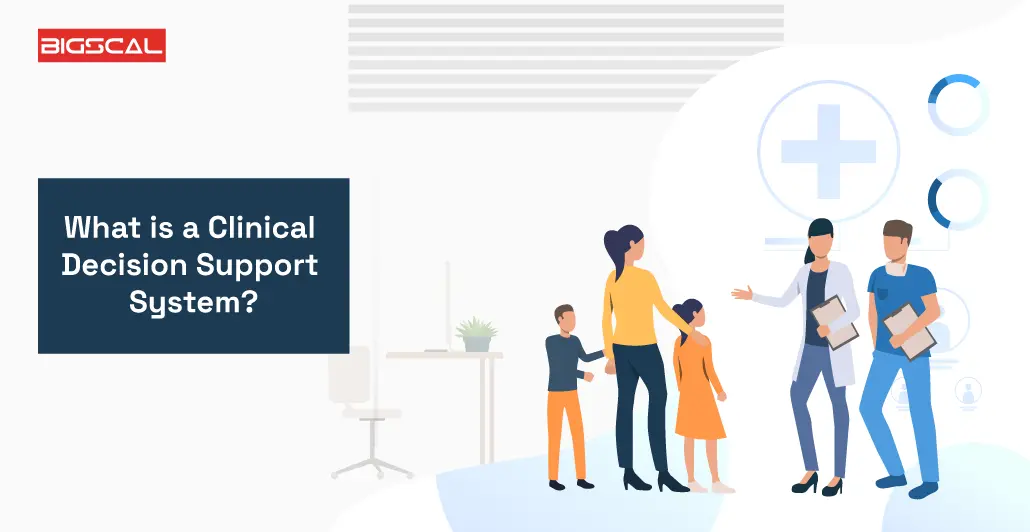
A Decision Support System healthcare, also popular as a Clinical Decision Support System (CDSS), is like an assistant for doctors. It is also one from a type of clinic management system. In addition, it helps them to make wise decisions about a patient’s treatment as it provides relevant information and suggestions based on medical data. It is a smart tool that analyzes patient organized clinical knowledge and research then it offers guidance to doctors for diagnosing.
In short, it’s like having a knowledgeable sidekick to enhance medical decision-making. If a doctor needs to decide the best treatment for a patient, the DSS will recommend options on the basis of similar cases and specific details of patients.
This system is not about replacing human judgment but to enhance it. This has led to its creation to make health care providers accessing the relevant health information faster for them to make informed choices. This implies that it assists physicians in navigating through a sea of medical data by improving patient care using technology.
Why healthcare professional use a CDSS or Decision Support Systems Healthcare
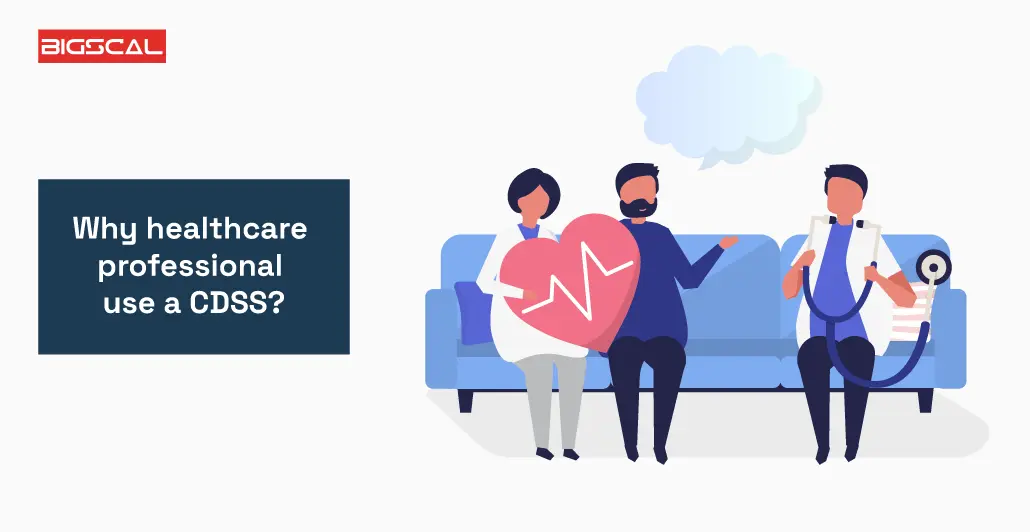
The use of decision support systems or CDSS by medical professionals is intended to improve health and clinical decision making. Similar to laboratory information management systems, these systems can also be referred to as digital tools or assistants that offer useful insights and recommendations based on patient data.
In such situations when doctors face a complicated medical condition – CDSS can review illness history, current symptoms and lab test results of the patients providing possible diagnoses among others. DSS incorporates new technologies so physicians and their staff keep up with advances in medicine and guidelines. Thus, it leads to faster decision making about health issues with lesser mistakes.
CDSS also helps in determining appropriate therapies or drugs that take into account drug interactions or drug allergy checking as well as patient allergies. For this reason, it improves the safety of the patients while guiding healthcare providers’ decisions involved in their well-being. Additionally, CDSS aids primary care providers in preventive care by identifying potential health risks and recommending preventive measures.
Decision Support Systems in healthcare are valuable. They support doctors in delivering accurate, timely, and personalized patient care. And along with that it also stays aligned with the constantly evolving field of medical knowledge.
Functions Of Decision Support Systems Healthcare
Understand CDSS functions read the following functions:
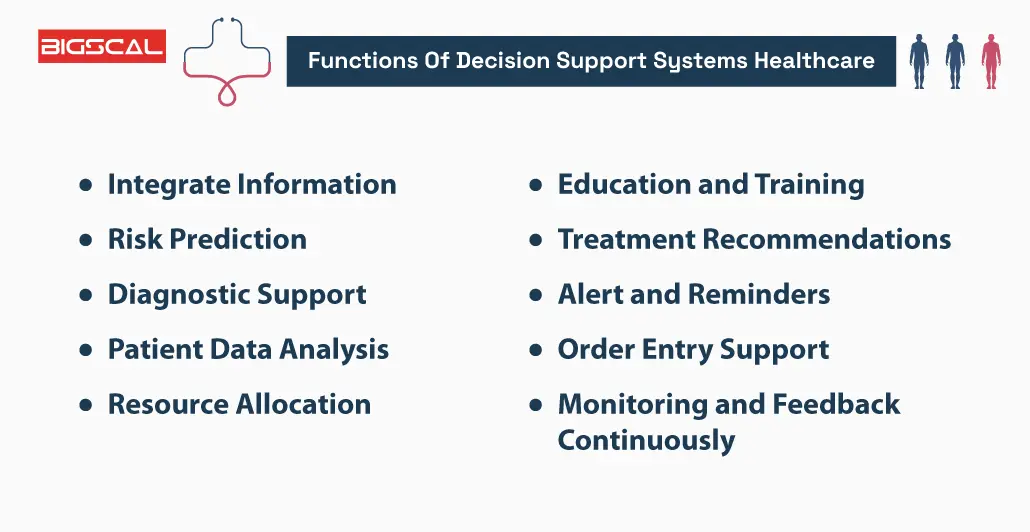
Integrate Information
Integration of primary function of clinical decision support system. Patient data reports are collected from all different sources. They consolidate information from lab results, EHR, diagnostic reports and other various clinical data systems, giving an overview to healthcare professionals. Additionally, it organizes and combines this information to provide insight into a patient’s health during emergencies as well as surgeries.
To illustrate, an example is that a DSS can integrate the patient’s medical history, ongoing treatments and diagnostic reports to provide a window. This information integration enhances efficiency and accuracy regarding health care decisions. It ensures that doctors have the necessary data at their fingertips.
Risk Prediction and Management
Also, clinical decision support systems have strong relationships with risk prediction mechanisms. DDS also predicts risk and manages it by using clinical practice guidelines leveraging data analytics. It uses advanced algorithms to analyze patient data, and consider various risk factors for adverse events and complications. With this, physicians are able to predict possible future problems. As such doctors can take preventive actions as well as personalized treatment plans.
For example, DSS will detect particular diseases based on genetic markers so that interventions can be targeted accordingly. The DSS’s predictive ability thus enhances patients’ health because healthcare providers can design their strategies better in order to minimize risks in the coverage of healthcare used.
Diagnostic Support
One of CDSS’s major functions is diagnostic support during treatment process. The use of advanced algorithms and data analytics made this possible. Because by leveraging these elements to analyze patient information and provide insights to assist the clinical team in identifying disease.
For example, if a patient has complex symptoms, a DSS will go through the medical databases, and trigger relevant patterns and potential diagnoses. This helps doctors to make more informed decisions and get accurate conclusions about a patient’s condition.
Patient Data Analysis
As the DDS aggregate information from different sources it analyzes patient data. It provides a full-fledged overview to doctors by processing vast amounts of patient data such as tests reports, treatment history, and medications.
For instance, if a patient has a chronic condition, a decision support systems healthcare can analyze trends over time, focused patient data reports highlight complex indicators, and suggest personalized treatments. This aids healthcare providers in tailoring treatments, optimizing care plans, and ultimately patient satisfaction.
Monitoring and Feedback Continuously
It also monitors and provides feedback continuously. A DSS collects and analyzes data from various sources continuously. Such sources include, patient, electronic health records, wearable devices, lab results, etc. This continuous monitoring and feedback support function of the clinical decision support system ensures that the doctors get real-time updates of their patients.
For instance, if the patient’s glucose levels get high unexpectedly, the DSS can immediately alert healthcare providers. This allows for timely adjustments and changes to the patient portal treatment plan, or recommendations for lifestyle changes. The continuous feedback loop created by DSS promotes healthcare management, preventing potential complications and enhancing the overall quality of patient care.
Treatment Recommendations
It also helps doctors by suggesting or recommending treatments. It’s analyzes patient information and symptoms to suggest appropriate treatment options for healthcare professionals. It processes all necessary information by considering factors like allergies, previous treatments, and test results. And electronic health record systems then provide relevant recommendations based on all these terms of care.
For example, suppose a diabetic patient visits a clinic. So, in such a case, DSS will recommend insulin dosage on the basis of a patient’s recent blood sugar levels, helping the healthcare team optimize the treatment plan for better outcomes.
Alert and Reminders
The clinical decision support solution also provides alerts and reminders. These alerts notify healthcare professionals about their tasks, upcoming appointments, medication alerts and other important issues. DSS alerts help prevent medication errors in a busy hospital setting, remind physicians of scheduled follow-up appointments, and ensure stick to clinical guidelines and best practices.
If a particular medicine is prescribed by a doctor and the decision support systems identifies a possible drug reaction based on the medical history of the patient, then he system would see negative drug interactions and generate an alert to the doctor to reconsider the prescription and choose a safer alternative.
Order Entry Support
It also enhances the process of placing medical orders. If a physician prescribes a new medication for a patient. The DSS not only records this order but also checks for potential drug interactions or allergies in the patient’s history.
For instance, when a doctor prescribes medication or diagnostic tests for a patient, the DSS assists in entering and managing these orders efficiently. It ensures accuracy by cross-referencing the prescribed treatments with the medical history, thus minimizing the risk of errors.
Resource Allocation
The clinical decision support systems also work as a resource allocator. It helps hospitals to optimize the allocation of resources. If a hospital experiences a surge in patient admissions, the DSS can analyze overall availability of staff, bed and equipment then it recommends efficient resource allocation strategies.
Suppose a busy emergency department where the DSS assesses real-time data on patient flow, available beds, and staff availability. It suggests reallocating nursing staff to emergency areas, ensuring timely patient care.
According to Productive io, the resource planning process covers a wide range of resource types. This includes human resources, funds, technology and materials, and time resources. In the continuously busy healthcare environment, having a clear image of resource availability is vital. Get the Detailed Guide By visiting this mentioned in this link.
Education and Training
Decision Support Systems in healthcare extend their impact to education and training. DSS are valuable tools for doctors to stay updated on the latest healthcare research, treatment protocols, and medical guidelines. Through interactive modules and case studies, DSS facilitates ongoing learning and skill development.
Staff training, for example, utilizes a DSS for various patient treatments, which allows nurses to practice decision-making in a risk free virtual environment. Similarly, DSS plays an important part when it comes to streamlining training materials and ensuring uniform clinical expertise among healthcare professionals. All these culminate into better patient care as well as overall improvement in the medical fraternity.
Types of Clinical Decision Support System
Following are the major type of Clinical Decision Support Systems:
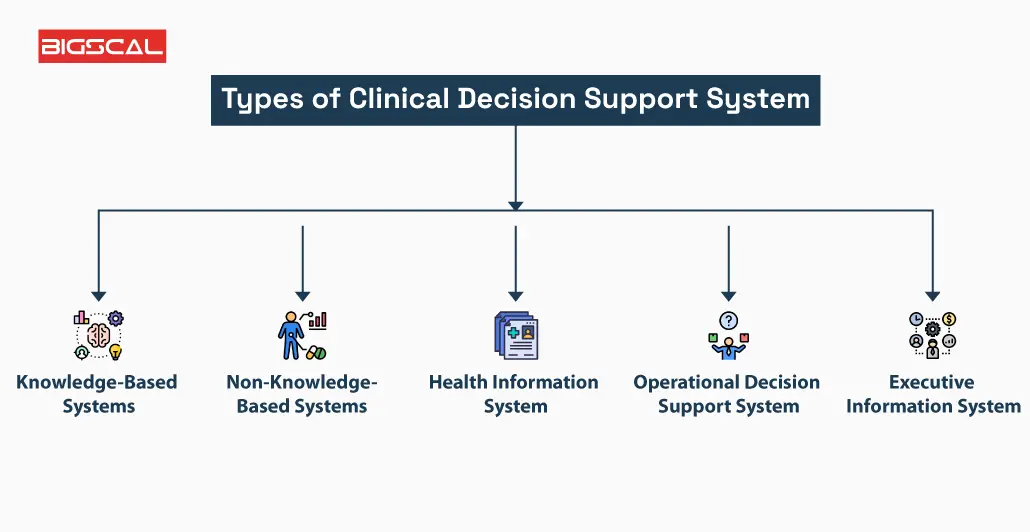
Knowledge-Based Systems
- Utilize explicit knowledge to provide recommendations.
- Rules and algorithms are defined based on medical expertise.
Non-Knowledge-Based Systems
- Use statistical or machine learning methods.
- Analyze data patterns to offer insights and predictions.
Health Information System
- Manage health-related information.
- Support decision-making across various healthcare processes.
Operational Decision Support System
- Assist in day-to-day operational decisions within healthcare facilities.
- Examples include systems for resource allocation and scheduling.
Executive Information System
- Designed for executives and high-level managers in healthcare organizations.
- Provide summarized information and support strategic decision-making.
What Are The Examples Of Clinical Decision Support Tools?
There different Examples Of Clinical Decision Support Tools let’s have a look at them:
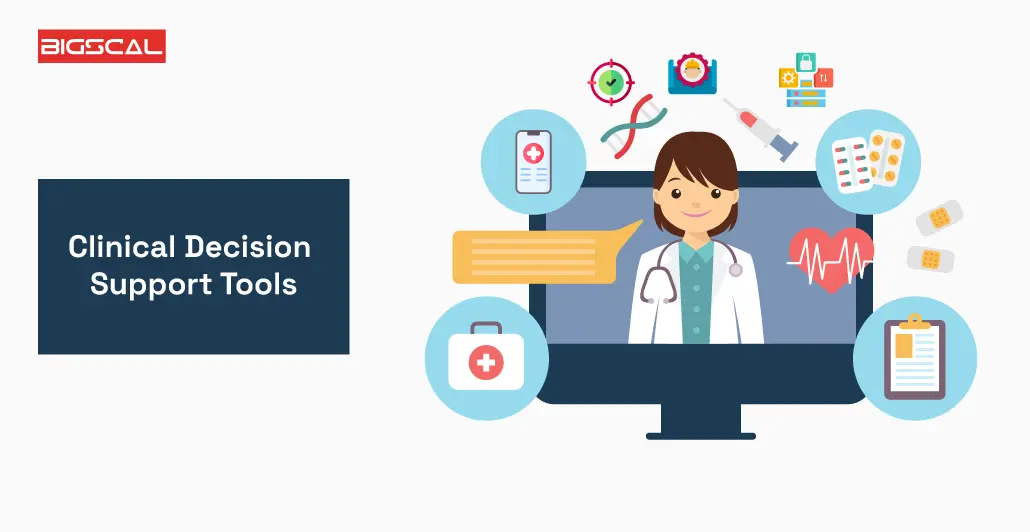
- Drug Interaction Checkers
- Mobile Health Apps
- EHR Clinical Decision Support
- Tools For Clinical Guidelines and Protocols
- Risk Assessment Tools
- Imaging Decision Support Tools
- Genomic Decision Support
- Integrated Computerized Alerts Tools
- Telemedicine Decision Support Tools
- Clinical Dashboards
- Clinical Score Calculators
- Computerized Physician Order Entry (CPOE)
Wanna Create clinical decision support solutions? Approach Bigscal Technologies!
It is also important for doctors and/or hospital owners who may wish to have decision support systems for their healthcare facilities to contact us. So why don’t you;
Our CDSS-creation approach involves employing innovative algorithms and artificial intelligence, which will help in handling and analyzing patient data more efficiently. Also, we design software that can easily be incorporated into existing software.
We use advanced technology and data analysis to create a more intuitive user interface. The algorithm we use analyzes our data resulting in real-time insight into the health of your patient. These are also able to accurately diagnose and plan treatment for you. As a result we modify it as per your requirements.
Once you partner with us, better healthcare outcomes and enhanced patient safety and satisfaction will not be an issue anymore. That’s all that matters . Further details can be accessed by contacting us directly.
Conclusion
So, here we are concluding our exciting topic. With that we hope you now have a clear understanding of decision support systems healthcare. We have added all terms that are necessary to know from its meaning to its benefits and functions.
It is a necessary tool for doctors to help them out throughout the entire healthcare journey of their patient. With their various innovative functions like data analysis, predictive modeling, and risk assessment, etc. allows healthcare professionals to navigate complex scenarios.
By harnessing this system you will not only promote evidence-based medicine-based practices but also contribute to the overall advancements of healthcare services.
FAQ
What is EHR Clinical Decision Support?
EHR clinical decision support CDS is technology that is integrated into EHRs. It provides real-time information and suggestions to help healthcare professionals in making decisions about patient care. It assists in treatment planning and diagnosis.
Give Decision support system examples in healthcare.
An example of a decision support system healthcare is IBM Watson for oncology. This system takes help of medical literature, clinical trial data, and patient records to assist oncologists to plan treatment plans for cancer patients. It leverages AI to provide recommendations and improve oncology.
Best clinical decision support company.
- Epic Systems
- Philips healthcare
- Hearst
- MEDITECH
- Siemens Healthineers
What are clinical decision support systems?
Clinical Decision Support Systems (CDSS) are software. It helps doctors to make wise decisions. These systems analyze patient data, medical literature, and best practices to offer insights, reminders, or recommendations for diagnosis, and treatment planning.
What are clinical decision support systems benefits?
- Improved patient outcomes
- Enhanced accuracy in diagnosis and treatment plans
- Reduced medical errors
- Increased efficiency in healthcare processes
- Better adherence to evidence-based practices
- Cost-effectiveness







